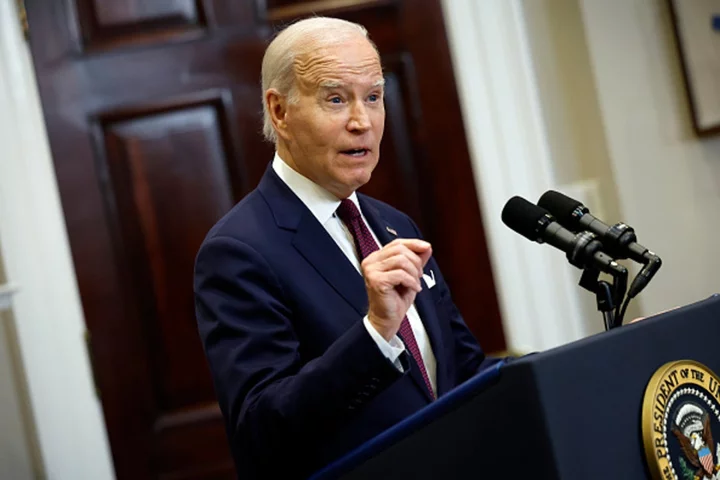
Biden condemns Supreme Court striking down affirmative action: ‘This is not a normal court’
President Joe Biden on Thursday said he “strongly, strongly disagree[d” with the Supreme Court’s decision to strike down the use of affirmative action programmes in college admissions decisions and condemned the six-justice majority that did so as “not a normal court”. Mr Biden’s harsh words for the highest court in the land came in response to a reporter’s query on whether the court was acting as a “rogue court,” just after he addressed the landmark decision in brief remarks before departing the White House for New York. Speaking from the Roosevelt Room in the West Wing, the president echoed the dissenting Justices, Sonia Sotomayor, Elena Kagan and Ketanji Brown Jackson, in his reaction to the ruling, which ends the long-standing precedent that allowed colleges and universities to use affirmative action to help establish a diverse group of accepted students. “Discrimination still exists in America. Today’s decision does not change that,” Mr Biden said in a brief press conference. He added: “I believe our colleges are stronger when they’re racially diverse. Our nation is stronger because we are tapping into the full range of talent in this nation. We cannot let this decision be the last word.” The rulings come from two consolidated cases, Students for Fair Admissions v University of North Carolina and Students for Fair Admissions v Harvard College. Both cases were brought forth by the anti-affirmative action organisation Students for Fair Admissions. That group, which is headed by conservative legal strategist Edward Blum, has for years made attempts to give the court’s GOP-appointed majority a chance to gut previous court precedents which have been used to justify limited use of race-based preferences in college admissions. While the court upheld such programmes in a decision nearly two decades, ago, the newly-emboldened conservative majority swept away any legal justification for them in Thursday’s opinions. In a 6-3 and 6-2 decision, the Court’s conservative majority sided with Students for Fair Admissions claiming the use of race-conscious admissions was a violation of the Equal Protection Clause of the 14th Amendment. Now, higher education institutions will no longer be allowed to consider race as a factor in admissions. Instead, students who wish to have their race or culture considered in their application will have to volunteer the information like in their personal essay. At the end of the press conference, Mr Biden responded to a question about the court’s decision to strike down a long-standing precedent: “This is not a normal Court.” Leaders from Harvard said in a letter that they would “comply” with the court’s decision but emphasised that “deep and transformative teaching, learning, and research depend upon a community comprising people of many backgrounds, perspectives, and lived experiences.” Mr Biden said he is directing the Department of Education to analyse best practices for high education institutions to create more inclusive and diverse student bodies without using race as a conscious factor in admissions and recruiting. The Harvard Black Students Association called the court’s decision, “detrimental”, adding that it “poses a significant threat to the future of the Black community on and beyond our campus.” “It is evident that the college application system cannot maintain holistic evaluation without taking into consideration how race profoundly influences our experiences, perspectives, and identities in multifaceted ways,” the Harvard Black Students Association wrote. Derrick Johnson, the president and CEO of the NAACP, said in a statement: “In a society still scarred by the wounds of racial disparities, the Supreme Court has displayed a willful ignorance of our reality.” Discussions around affirmative action have generated debate among Republicans and Democrats for years. Those in support of it believe it is necessary to create fair and equal opportunity for students of color because higher education institutions have failed at creating diverse student bodies. Those against affirmative action believe it puts other students, like white or Asian American students, at a disadvantage. Former president Donald Trump celebrated the ruling calling it “everyone was waiting for” in a post on Truth Social. “We’re going back to all merit-based – and that’s the way it should be!” Mr Trump wrote. Mr Trump appointed three of the six conservative Justices on the Court while serving as President of the United States – Justices Neil Gorsuch, Brett Kavanaugh and Amy Coney Barrett. Mr Trump’s former vice president, Mike Pence, also expressed support for the Court’s decision, writing on Twitter, “I am honored to have played a role in appointing three of the Justices that ensured today’s welcomed decision.” He added: “There is no place for discrimination based on race in the United States, and I am pleased that the Supreme Court has put an end to this egregious violation of civil and constitutional rights in admissions processes, which only served to perpetuate racism.” The ruling will likely have repercussions beyond higher education institutions, extending to elementary, middle and high schools as well as workplaces and more as it opens a door for challenges to racial diversity programs. Read More Justice Ketanji Brown Jackson delivers searing civil rights lesson in dissent to affirmative action ruling How the government that promised to ‘stop the boats’ has lost control of its immigration policy Clarence Thomas says he doesn’t have a ‘clue’ what diversity means as Supreme Court takes aim at affirmative action One year after the anti-abortion ruling, the White House keeps a spotlight on the issue
2023-06-30 02:16
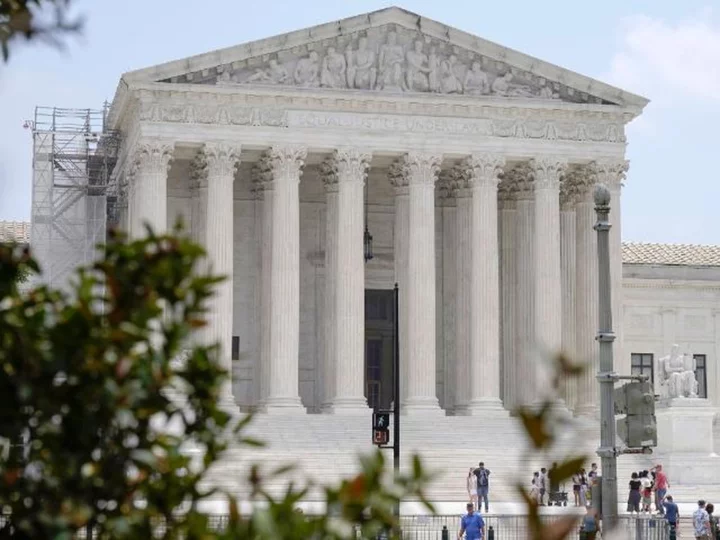
Supreme Court guts affirmative action in college admissions
The Supreme Court says colleges and universities can no longer take race into consideration as a specific basis for granting admission, a landmark decision that overturns long-standing precedent that has benefited Black and Latino students in higher education.
2023-06-29 22:25

Cambodian leader Hun Sen, a huge Facebook fan, says he is jumping ship to Telegram
Cambodian Prime Minister Hun Sen, a devoted and very active user of Facebook — on which he has posted everything from photos of his grandchildren to threats against his political enemies — said Wednesday that he will no longer upload to the platform and will instead depend on the Telegram app to get his message across. Telegram is a popular messaging app that also has a blogging tool called “channels.” In Russia and some of the neighboring countries, it is actively used both by government officials and opposition activists for communicating with mass audiences. Telegram played an important role in coordinating unprecedented anti-government protests in Belarus in 2020, and currently serves as a major source of news about Russia’s war in Ukraine. The 70-year-old year Hun Sen is listed as having 14 million Facebook followers, though critics have suggested a large number are merely “ghost” accounts purchased in bulk from so-called “click farms,” an assertion the long-serving prime minister has repeatedly denied. The Facebook accounts of Joe Biden and Donald Trump by comparison boast 11 million and 34 million followers, respectively, though the United States has about 20 times the population of Cambodia. Hun Sen officially launched his Facebook page on Sept. 20, 2015, after his fierce political rival, opposition leader Sam Rainsy, effectively demonstrated how it could be used to mobilize support. Hun Sen is noted as a canny and sometimes ruthless politician, and has since then managed to drive his rival into exile and neutralize all his challengers, even though Cambodia is a nominally democratic state. Hun Sen said he is giving up Facebook for Telegram because he believes the latter is more effective for communicating. In a Telegram post on Wednesday he said it will be easier for him to get his message out when he is traveling in other countries that officially ban Facebook use. China, the top ally of his government, is also the biggest country with a Facebook ban. Hun Sen has 855,000 followers so far on Telegram, where he appears to have started posting in mid-May. It is also possible that Hun Sen’s social media loyalty switch has to do with controversy over remarks he posted earlier this year on Facebook that in theory could see him get at least temporarily banned from the platform. As the country’s top leader for 38 years, he has earned a reputation for heated rhetoric, and in January, speaking at a road construction ceremony, he decried opposition politicians who accused his ruling Cambodian People’s Paty of stealing votes. “There are only two options. One is to use legal means and the other is to use a stick,” the prime minister said. “Either you face legal action in court, or I rally (the Cambodian) People’s Party people for a demonstration and beat you up.” His remarks were spoken on Facebook Live and kept online as a video. Perhaps because of heightened consciousness about the power of social media to inflame and trigger violence in such countries as India and Myanmar, and because the remarks were made ahead of a general election in Cambodia this July, complaints about his words were lodged with Facebook’s parent company, Meta. Facebook’s moderators declined to recommend action against Hun Sen, judging that his position as a national leader made his remarks newsworthy and therefore not subject to punishment despite their provocative nature. However, the case was forwarded in March to Meta’s Oversight Board, a group of independent experts that is empowered to render an overriding judgment that could limit Hun Sen’s Facebook activities. They may issue a decision in the next few weeks. The case is being closely watched as an indicator of where Facebook will draw the line in countries with volatile political situations. Hun Sen said his Facebook account will remain online but he will no longer actively post to it. He urged people looking for news from him to check YouTube and his Instagram account as well as Telegram, and said he has ordered his office to establish a TikTok account to allow him to communicate with his country’s youth.. ___ Peck reported from Bangkok. Dasha Litvinova contributed from Tallinn, Estonia. Read More Ukraine war’s heaviest fight rages in east - follow live Charity boss speaks out over ‘traumatic’ encounter with royal aide Cambodian lawmakers approve changes to election law that disqualify candidates who don't vote Trump’s latest defence in the classified documents case: ‘Bravado’ Trump gives ‘bravado’ defence for secret papers tape as he sues E Jean Carroll – live
2023-06-29 00:54
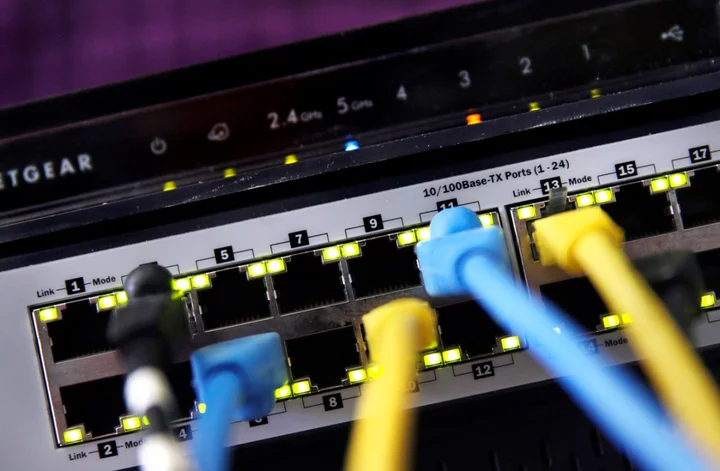
LOCALIZE IT: Biden announced billions of dollars to expand broadband. What's next?
EDITORS/NEWS DIRECTORS: The Biden Administration released details about the $42.5 billion cornerstone of its Internet for All initiative on Monday. The money, which state governments will eventually award broadband providers, has the chance to be transformative in communities with inadequate service or exorbitant costs. Funding amounts from the Broadband Equity, Access and Deployment (BEAD) program depended primarily on the number of unserved locations in each jurisdiction. Unserved locations are those that lack access to internet download speeds of at least 25 megabits per second download and upload speeds of 3 Mbps. Download speeds involve retrieving information from the internet, including streaming movies and TV. Upload speeds determine how fast information travels from a computer to the internet, like sending emails or publishing photos online. The federal government used the FCC’s National Broadband Map to identify the number of unserved locations in each jurisdiction. Before states can draw down on those funds, they must engage in a multi-step approval process with the federal government to ensure the money is deployed to the communities that need it the most. ___ AP’S LATEST COVERAGE Biden’s broadband plan aims to connect every home and business in U.S. by 2030. What’s next? High-speed internet is a necessity, President Biden says, pledging all US will have access by 2030 ___ VIEW YOUR STATE'S BEAD FUNDING ALLOTMENT AND PERCENT OF AREAS UNSERVED — The AP produced a dataset showing each state’s allotment in dollars and the percent of Broadband Serviceable Locations—homes and businesses where high-speed internet could be installed—that are estimated to be unserved, according to the latest version of the FCC National Broadband Map. ___ VIEW DETAILED BROADBAND MAPS AND FUNDING MAPS — The FCC National Broadband Map is an updating dataset that shows advertised internet speeds at the address level. Version 2 is the latest public iteration and was used to determine states’ BEAD allotments. The default view of the map shows residential service provided by all types of technology with download speeds of at least 25 Mbps and upload speeds of at least 3 Mbps. The federal government defines reliable service as that which is provided through wired or fixed wireless technologies. To view coverage provided by reliable technologies only, click the gear icon on the righthand side of the page. Under technologies, select “All Wired and Licensed Fixed Wireless.” In this menu, you can also choose to view coverage of businesses instead of residences and set different speed minimums. — Check out the FCC Broadband Funding map. This offers details on funding from some other federal broadband expansion programs. To view a breakdown of projects and funding in a given area, click the Funding Summary button (to drill down, make sure you're zoomed in to at least level 10, then click on individual hexagons for details). To view the percentage of areas unserved or unfunded, click the Location Summary button. To view maps by funding type, click on the different links below the Broadband Funding Summaries heading in the pop-up box. ___ VIEW OTHER RESOURCES — The National Telecommunications and Information Administration (NTIA) is administering the BEAD program. It is keeping track of which states have released initial proposals, which must be approved before states can begin the grant making process. Initial proposals are due by the end of the year and can be submitted in two volumes. On this page are also links to 5-year-plans, which lay out how states hope to achieve universal connectivity, and digital equity plans, covering how states aim to equip individuals with the skills and devices necessary to leverage internet access. You can sign up to receive email updates when new proposals and plans are released. States with initial proposals released: Louisiana (volume 1) Virginia (volume 1) States with 5-year plans released: Hawaii Maine Montana Ohio Utah Draft Digital Equity Plans: Louisiana Maine Montana Utah — Nonprofits, internet service providers and local and Tribal governments will eventually have the opportunity to assess their state’s determinations of which locations are eligible for funding and challenge those decisions. The NTIA has published draft guidance for how those challenge processes will run, and final guidance is expected soon. ___ QUESTIONS/REPORTING THREADS — What is your state’s allotment from BEAD? How have state and local officials reacted to this amount? Do they believe it will be enough to connect people who are still without access to reliable internet? — Which counties in your state are the most digitally distressed? Are there any demographic or socioeconomic similarities between these areas? Are they geographically consolidated or spread throughout the state? Do any counties with poor connectivity border counties that have good internet access? — Are there any topographic or climatic challenges, such as mountains and year-round cold weather, to laying down fiber in your state? How do state officials plan to overcome these challenges? Are there any remote counties or towns? — What is the landscape of existing broadband aid in your state? Broadband expansion projects from other federal programs, including the USDA’s ReConnect program and the American Rescue Plan, are ongoing. Additionally, states run their own grant programs aimed at closing the digital divide. How are these projects going? How have completed projects affected the lives of people in that area? How do these existing projects work with your state's plans to use BEAD funding? ___ READ ADDITIONAL AP COVERAGE $930 million in grants announced in Biden’s effort to expand internet access to every home in the US States contend with short timeline to correct broadband map ___ Localize It is an occasional feature produced by The Associated Press for its customers’ use. Questions can be directed to Katie Oyan at koyan@ap.org. Read More Ukraine war’s heaviest fight rages in east - follow live Charity boss speaks out over ‘traumatic’ encounter with royal aide UN urges Israel and Palestinians to halt West Bank violence in statement backed by US and Russia EPA retreats on Louisiana investigations that alleged Blacks lived amid higher cancer risk US push to lower wildfire risk across the West stumbles in places
2023-06-28 23:50
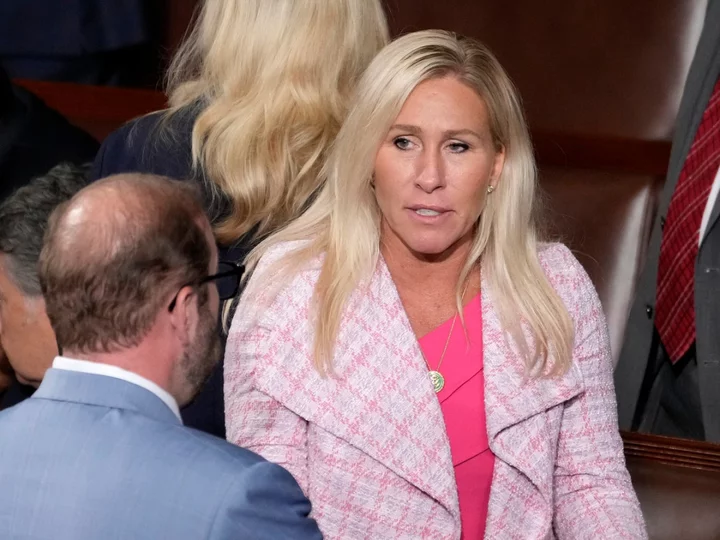
Marjorie Taylor Greene mocked for bizarre tweet boasting about good health and claiming her TV is spying on her
Georgia Republican Marjorie Taylor Greene posted a lengthy tweet bragging about her health and exercise regimen after claiming that her TV in her DC residence appears to be spying on her. On Sunday morning, Ms Greene wrote: “Last night in my DC residence, the television turned on by itself and the screen showed someone’s laptop trying to connect to the TV.” “Just for the record: I’m very happy. I’m also very healthy and eat well and exercise a lot. I don’t smoke and never have. I don’t take any medications. I am not vaccinated. So I’m not concerned about blood clots, heart conditions, strokes, or anything else. Nor do I have anything to hide,” Ms Greene added, possibly in a reference to the novel 1984, where residents are spied on by the state via their TVs. “I just love my country and the people and know how much they’ve been screwed over by the corrupt people in our government and I’m not willing to be quiet about it, or willing to go along with it,” she concluded, before adding a link to a CBS News story about Smart TVs possibly spying on their users, according to the FBI. The agency issued a warning in late 2019 saying that Smart TVs could be hacked and access could be gained to a home’s computer network. The FBI noted that while Smart TVs are connected to the Internet, they’re often much less secure than computers and smartphones. This means that cybercriminals may use the TVs to access home routers, TechCrunch noted at the time. “Beyond the risk that your TV manufacturer and app developers may be listening and watching you, that television can also be a gateway for hackers to come into your home,” the FBI warning said at the time. Ms Greene was quickly mocked by Twitter users for seemingly suggesting that the government was spying on her via her TV. “Yeah every time someone tries to access my WiFi I know that means they’re coming to kill me,” historian Kevin Kruse tweeted. “Was the deep state trying to watch your tv shows?” Josh Marshall of Talking Points Memo tweeted. “Am I the only one who doesn’t know what the tv screen looks like when it shows ‘someone’s laptop trying to connect to the TV.’ I wanted to be prepared for when I have my first psychotic break.” “It happens all the time in apt buildings. Someone chooses the wrong tv. You say deny and move on,” Greg Gadren responded. “Do people not know about smart tvs? I’ve accidentally tried to connect to other people’s tv in my apartment complex. It doesn’t mean I’m trying to spy, nor does it mean anything weird is happening,” one account holder said. “You should IMPEACH THE TV,” one Twitter user said. “What is apple play for $200.” “Have you considered an exorcism?” another account holder said. “Are they in the room with us right now?” California Democrat Eric Swalwell joked. “I feel like a neighbor accidentally trying to Airplay to your TV isn’t an assassination attempt?” Hayden Clarkin said. “I am laughing so f****** hard. A neighbor trying to screen share something accidentally clicked ‘Samsung-8237’ instead of ‘Samsung-1490’ and this delusional nut job is issuing a final will and testament,” Caleb Hearon said. Read More Speaker McCarthy supports expunging Trump's impeachments over Ukraine and Jan. 6 Arizona election denier Kari Lake ‘couch-surfing like a bum’ at Mar-a-Lago, ex-Trump lawyer says Lauren Boebert reveals she’s officially a grandmother as she avoids question about Marjorie Taylor Greene spat Trump allies in Congress seek to expunge impeachments Lauren Boebert reveals she’s officially a grandmother at age 36 Marjorie Taylor Greene calls Lauren Boebert a ‘little b****’ on House floor
2023-06-26 21:53
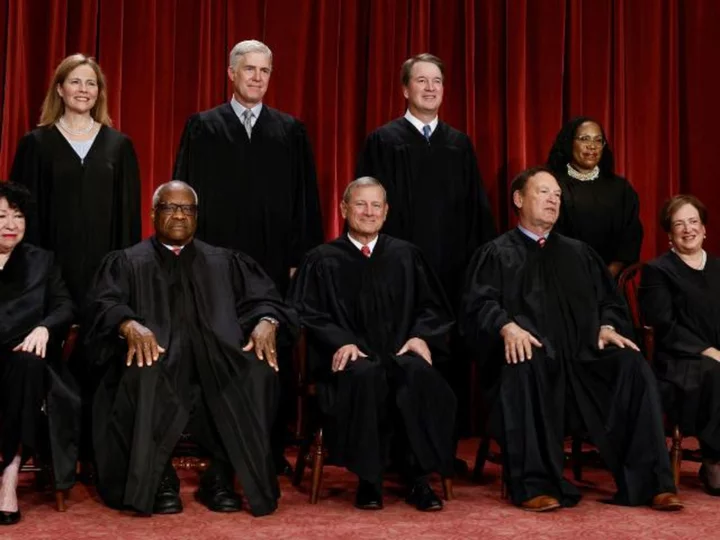
Here's what's left for the Supreme Court's final week of the term
All eyes are on the Supreme Court for its final week, as the justices will release cases on issues such as affirmative action, student loan payments, election law and LGBTQ rights.
2023-06-26 17:29

Multiple US Navy personnel say they've received potentially malicious smartwatches in the mail
The US Naval Criminal Investigative Service is investigating after multiple Navy personnel reported receiving unsolicited smartwatches in the mail that could be installed with data-stealing malicious software, an NCIS spokesperson told CNN on Friday.
2023-06-24 04:48

Global hack blamed on Russian cybercriminals affects insurance giant and California pension fund
The fallout from a global hacking incident tied to Russian cybercriminals widened on Thursday as US insurance provider Genworth Financial revealed that 2.5 million of its policyholders and customers had their data accessed in the hack, while California's public pension fund said 769,000 of its members were affected.
2023-06-23 21:52

From ChatGPT to executive orders: Inside the White House's urgent push to regulate AI
President Joe Biden huddled in the Oval Office with several of his top advisers in early April as an aide typed prompts into ChatGPT: Summarize the Supreme Court's New Jersey v. Delaware ruling and turn it into a Bruce Springsteen song.
2023-06-21 05:00
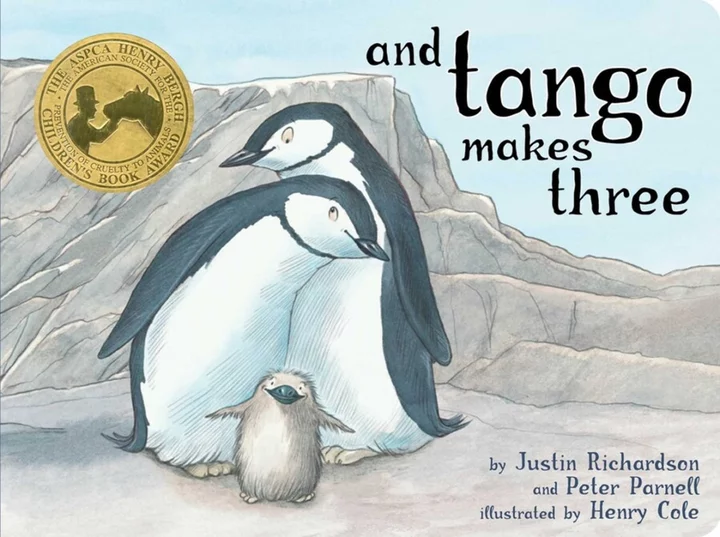
‘And Tango Makes Three’ penguin picture book authors sue Florida over ban under ‘Don’t Say Gay’ law
A group of Florida students and the authors of an award-winning children’s picture book about the true story of a penguin family with two fathers have argued that a Florida school district unconstitutionally restricted access to the book under what opponents have called the state’s “Don’t Say Gay” law. A lawsuit filed in federal court on 20 June argues that the Lake County school district’s decision to pull And Tango Makes Three “cited no legitimate pedagogical reason for its decision” and was restricted only for “illegitimate, narrowly partisan and political reasons.” Last year, Lake County officials announced that the title was “administratively removed due to content regarding sexual orientation/gender identification” prohibited under the “Parental Rights in Education Act,” what critics have called the “Don’t Say Gay” law. That measure, signed into law by Governor Ron DeSantis last year, broadly prohibits “classroom instruction” on issues related to “sexual orientation or gender identity” in kindergarten through third grade” or “in a manner that is not age appropriate or developmentally appropriate for students in accordance with state standards” in other grades. Mr DeSantis signed a measure this year that explicitly expands the law to cover all school grades. Opponents have warned its broad scope could effectively block discussion of LGBT+ people, history and events from state schools, and be weaponised against students, staff and their families under threat from potential lawsuits against school districts over perceived violations. The lawsuit from the book’s authors Justin Richardson and Peter Parnell and the families of several young students argues that such restrictions violate First Amendment protections, including the authors’ right to freedom of expression and students’ rights to receive information. And Tango Makes Three “tells a true and heartwarming story, and it teaches students about animal behavior, adoption, diversity among family structures, and responsible family values,” the lawsuit states. “The authors wrote Tango to spread a message of tolerance and equal treatment. They have a sincere and strongly held desire to ensure that Tango is available to children learning about animal behavior, adoption, and family structures, whether similar to or different from their own – and the student plaintiffs wish to read Tango to learn about those very subjects,” the plaintiffs wrote. The book was listed among free expression group PEN America’s most-banned picture books of the last school year. Last year, a record high of more than 1,200 attempts to remove books from schools and libraries were reported to the American Library Association. There were at least 1,477 attempts to ban 874 individual book titles within the first half of the 2022-2023 school year, according to PEN America. The figures mark a nearly 30 per cent spike from book challenges over the previous year. Book ban attempts have largely targeted books by and about LGBT+ people, titles written by or involving people of colour, or materials featuring honest discussions of race and racism, according to PEN America. Mr DeSantis and his administration have repeatedly rejected characterising such restrictions as “book bans” and have accused media outlets of manufacturing a “hoax” and a “fake narrative” surrounding them. The state has been at the centre of book challenges and legal battles over school and library materials as the DeSantis administration implements a sweeping agenda targeting public education and lessons and speech he deems objectionable. PEN American and Penguin Random House, one of the largest book publishers in the world, and several prominent authors and families have also sued a separate school district and school board in Florida’s Escambia County. A lawsuit filed in US District Court last month argues that school officials have pursued an “ideologically driven campaign to push certain ideas out of schools” against the recommendation of experts. “This disregard for professional guidance underscores that the agendas underlying the removals are ideological and political, not pedagogical,” the lawsuit states. The Independent has requested comment from the state’s Department of Education. Read More A zoo, Black History event and university funding: Ron DeSantis under fire after vetoing local funding because lawmakers didn’t endorse him DeSantis wants to model America after Florida. Civil rights groups are sounding the alarm on his ‘hostile’ agenda The school librarian in the middle of Louisiana’s war on libraries ‘They were trying to erase us’: Inside a Texas town’s chilling effort to ban LGBT+ books Biden condemns ‘hysterical’ threats to LGBT+ Americans as White House pushes back on book bans Florida mom who tried to ban Amanda Gorman’s book has ties to far-right groups
2023-06-21 04:17

Millions of Americans' personal data exposed in global hack
Millions of people in Louisiana and Oregon have had their data compromised in the sprawling cyberattack that has also hit the US federal government, state agencies said late Thursday.
2023-06-16 22:23
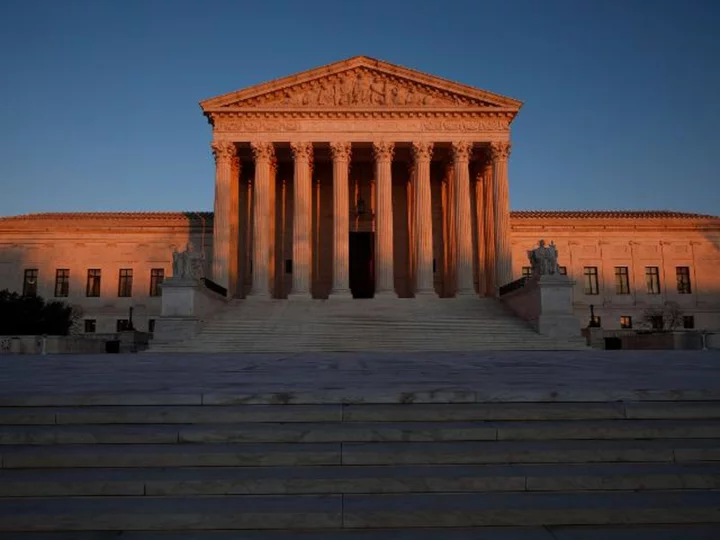
Supreme Court's conservative majority to decide direction of law on race, elections and religious freedom this month
As the Supreme Court races to issue all outstanding opinions by a self-imposed early July deadline, there is little doubt that the conservative majority is prepared to continue the right-ward trajectory on areas of the law.
2023-06-16 20:30
